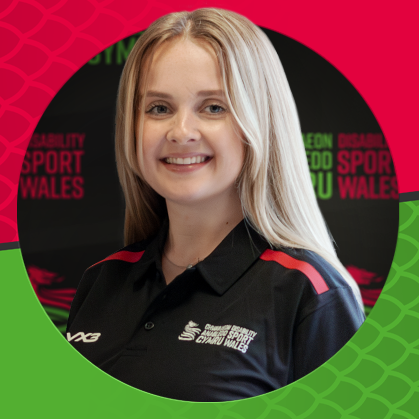
Can you describe your current role and how you got there after graduating?
I am currently working split roles at Disability Sport Wales and Welsh Athletics. My role at Welsh Athletics is Inclusion and Engagement Coordinator where I am the lead for Equality, Diversity and Inclusion which includes coordinating various ED&I frameworks, data and insight projects and the Young Athletics ambassadors. I started at Welsh Athletics just as I was finishing the write-up for my PhD thesis (not the best timing!) and have been there for just over two years now. Just over a year ago, I was approached by Disability Sport Wales to become Deaf Sport Senior Officer to which I jumped at the opportunity. My role at Disability Sport Wales includes developing sport and physical activity pathways for D/deaf and Hard of Hearing individuals across Wales and also supporting Wales Deaf Sport with their governance and delivery of their strategy.
How did your degree contribute to your career development?
Both my undergraduate and Masters were Sport and Exercise Psychology which both definitely taught me many transferable and key skills that I use today, however it was my research projects and subsequent PhD that significantly contributed to my career. My PhD was specific to Deaf Athletics – I informed the development of a standardised starting system to promote equity between D/deaf and hearing athletes – and now I work in an athletics specific role and a D/deaf sport role. It is kind of the best of both worlds! My PhD consolidated my drive and ambition to work in D/deaf sport as a career and the types of role I aspire towards for the future.
What was the biggest challenge you faced when starting your career, and how did you overcome it?
Having done my undergraduate, Masters and PhD back-to-back, my wider experience was largely centred around academia and I was worried about how I would find it in the public sector as it is a completely different environment and culture. Throughout my academic journey at Bangor, I became used to working independently and in a very small team so it was a big shift when I moved to the sport sector with much bigger teams across multiple departments. Being confident in my skillset and pushing myself out of my comfort zone to work well in new environments helped me to overcome my worries.
Are there any specific skills from your course that you use regularly in your job?
I regularly have to write reports, case studies and create insight which are helped by my experience of academic writing. My knowledge of data collection, both qualitative and quantitative, and data analysis have been very helpful in both of my jobs.
How important has networking been in your career progression?
Networking has been critical to my career progression. By attending webinars, events and conferences across the sport sector, I have hugely expanded my network and contacts across Wales. I now have connections with multiple National Governing Bodies, Local Authorities, organisations, clubs and individuals which have all been imperative to my career and work.
What advice would you give to recent graduates entering the job market?
Build your connections and out-of-academia experience where possible. The job market is incredibly challenging at the moment so having experience that strengthens your CV and skills is worth having. One way of doing this is by volunteering with organisations, I volunteered with British Athletics before starting at Welsh Athletics which supported my application.
Are there any professional qualifications or certifications you'd recommend pursuing?
I have just recently completed my Level 4 Certificate in Sports Governance which has already been very useful in my role at Disability Sport Wales and have also been continually learning British Sign Language (again, I have recently completed my Level 4) to build my wider skillset and communication skills. If you have a specific career or area in mind, explore whether there are any chartered courses available additional to your degree.
Where do you see the biggest career opportunities in the field of sport and exercise right now?
There are a huge number of National Governing Bodies and organisations across Wales that regularly have job openings – look on the Sport Wales website as often jobs are listed on there. Depending on your area of interest, many health boards are starting to incorporate more sport and exercise science (e.g., physiotherapy and exercise rehabilitation) into their delivery.
What would you tell someone considering a degree at Bangor University?
Bangor University is a fantastic place to undertake your degree (or three, in my case!) – there is so much to do in the surrounding areas and across North Wales and there are some excellent facilities, lecturers and researchers across the university. Bangor has a campus community feel without being on one campus which makes for a great university experience. The Clubs and Societies are a huge asset to Bangor and were a huge part of my time.
How would you describe your time at Bangor in 3 words?
Encouraging, affirming and transformative.
